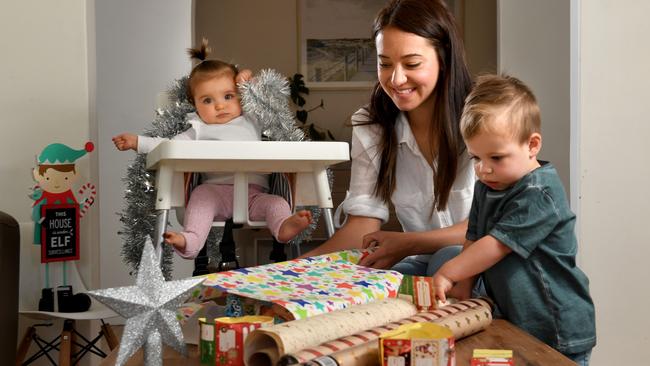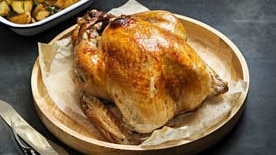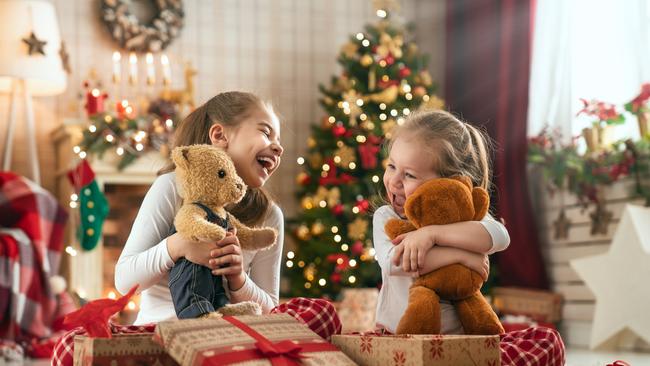Christmas 2020: Why you should be saving and spending 100 days out from Christmas
While Christmas Day celebrations remain up in the air for many, the annual financial strain on households remains. Here’s why this year you should start planning earlier than usual.
SmartDaily
Don't miss out on the headlines from SmartDaily. Followed categories will be added to My News.
COVID-19 and potential delays on items such as toys means Aussies are being urged to get organised now for a festive season like no other.
This week marks the 100-days-until-Christmas milestone. And while travel, family gatherings and restrictions are up in the air, the event will still be expensive.
And potential retail supply issues caused by COVID-19 mean last-minute shopping is off the menu.
MyBudget director Tammy Barton says 100 days out is a great time to start if you don’t already have a Christmas savings plan.
There are budgeting tools on financial firms’ websites to help prepare, or you can write a simple Christmas spending list covering presents, food, alcohol, decorations, donations, transport and holidays.

We asked retail and finance experts their advice:
TOYS AND GIFTS
Finder.com.au spokeswoman Bessie Hassan says people should compare products and prices online, be realistic about what they can afford and use budgeting apps and tools.
“There are at least five major sales days between now and December where prices will be slashed across a huge range of products,” Hassan says.
“These include Black Friday or Cyber Monday where you can nab a bargain.”
Kmart’s divisional merchandise manager, Robert Day, says its season launch is mid October and it is yet to finalise the Christmas delivery cut off dates due to COVID-19 uncertainty.
“We anticipate a resurgence of backyard play toys such as trampolines and swing sets, scooters, bikes, and activity based toys such LEGO, puzzles, crafting and board games,” Day says.
“For the teens: portable speakers, bluetooth headphones and gaming headphones, as well as bikes, scooters and skateboards.”
Catch.com.au chief marketing officer Ryan Gracie said it will be a big year for tech gifts too.
“Some of our best sellers for the whole family to enjoy include smart home products, televisions, and gaming consoles — Nintendo Switch has been very popular,” he said.
“Polaroid and Fujifilm Instax instant cameras are always popular with young Aussies, while GoPro action video cameras, smartwatches, fitness trackers and wireless headphones are a hit with active Aussies.”
eBay Australia spokeswoman Sophie Onikul advises using a retail app rather than risking crowded stores.
“We’ve also seen an increased demand for products made and sold by Australian sellers as buyers rally to support local, so we expect this motivation will drive toy purchases too,” she says.
IKEA Australia fulfilment unit operations manager Adrian Pidgeon said the company will continue to offer a range of convenient delivery options across the entire year, including parcel delivery for smaller items and truck delivery for larger orders.

FOOD AND DRINK
Barton says it’s not too soon to start stashing Christmas food.
“Buy frozen and non-perishable foods now and make plans with your family and friends for how you’re going to celebrate,” Barton says.
And don’t forget to budget for fun. “A common Christmas oversight is to budget for gifts, then overlook the added costs of entertaining, drinks, decorations, wrapping, work parties and going out,” Barton says.
For turkey supplier Ingham’s it’s business as usual with COVID-19 having no impact on its turkey operation. Supermarkets nationally are working closely with suppliers but have to factor in COVID-19 constraints, especially with distribution.
Retailer Dan Murphy’s also wants customers to plan ahead and shop early this year to help maintain social distancing.
“We’re working closely with our international suppliers to ensure we have our customers’ favourite products in stores,” a Dan Murphy’s spokeswoman says.

TRAVEL
Flight Centre spokesman Haydn Long says the lack of direction about lifting border restrictions makes domestic travel advice difficult, but it’s good to book early.
“Look for flexible options,” he says. “Then, if conditions or restrictions change, you can easily amend your plans.”
Airbnb country manager Susan Wheeldon says there is a trend towards longer-term stays this year as more people work from home.
“We’re particularly seeing bookings surge in untapped regional areas within driving distance of major cities,” she says.
Jazmyne Campbell, 32, has an automated Christmas savings plan for her family that delivers $1000 in early December.
“We’re not stressed about getting the cash – this is our third Christmas and I don’t think about the finances,” she says.
A new survey by Finder shows more than one-third of Australians plan to spend less on Christmas 2020 than last year, largely because they expect less travel.
It found consumers would spend an average $969 on Christmas including $386 on gifts, $40 on decorations and $41 on donations, with more than one quarter putting it on credit.

YOUR CHRISTMAS CALCULATOR
There are free budget planners on financial institution websites, and Christmas-specific planners at mybudget.com.au and beyondbank.com.au, or you can use this guide.
1. List all expected expenses including gifts (including rough dollar amounts per person), food and drink, decorations, transport, travel, postage, entertainment, spending money and donations.
2. Add a buffer of 10-20 per cent to cover overspending.
3. Deduct any existing Christmas savings.
4. Divide the remaining amount by the number of weeks until Christmas – currently 14 – to work out what to save weekly without going into debt.
5. Start an automatic direct debt into a separate account to reduce stress this year and cover Christmas completely next year.
